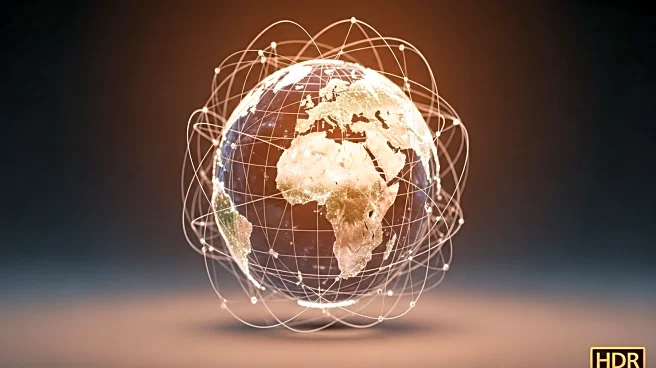What is the story about?
What's Happening?
External Affairs Minister S Jaishankar has highlighted the necessity of a global workforce in response to President Trump's recent imposition of a $100,000 fee on H-1B visas. This fee primarily impacts Indian professionals, who constitute a significant portion of H-1B visa holders. Jaishankar's remarks were made during an event hosted by the Observer Research Foundation on the sidelines of the UN General Assembly. He emphasized the need for a more efficient model of a global workforce that can be distributed across various locations, addressing the demographic challenges faced by many countries. Jaishankar also noted the importance of building national capacities to achieve multipolarity and self-reliance, particularly in large countries like India.
Why It's Important?
The new fee on H-1B visas could significantly affect the U.S. tech industry, which relies heavily on skilled professionals from India. This move may lead to increased costs for companies that depend on H-1B visa holders, potentially impacting their ability to hire international talent. The fee hike also raises broader questions about immigration policy and its role in shaping the global workforce. As countries grapple with demographic challenges, the need for a distributed global workforce becomes more pressing. Jaishankar's call for a reimagined workforce model highlights the potential for new trade arrangements and partnerships, which could reshape international economic relations.
What's Next?
The fee increase may prompt companies to explore alternative visa options, such as the O-1 visa, to attract international talent. Additionally, countries like the U.K. are considering streamlining visa processes for researchers to mitigate the impact of these changes. The debate over immigration policy and global workforce distribution is likely to continue, with potential implications for international trade and economic partnerships. Stakeholders, including businesses and policymakers, will need to navigate these changes and adapt to the evolving landscape of global labor markets.
Beyond the Headlines
The fee hike on H-1B visas underscores the broader geopolitical dynamics at play, as countries seek to balance national interests with global workforce demands. This development may lead to increased scrutiny of immigration policies and their impact on economic growth and innovation. The emphasis on building national capacities and self-reliance reflects a shift towards multipolarity, where countries aim to reduce dependency on external markets and supply chains. As the world becomes more interconnected, the challenge of managing unpredictability and volatility in policy changes remains a critical concern for global leaders.















